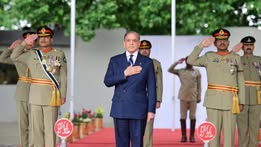
Online Desk: Terrorism in Pakistan has evolved into a multifaceted, asymmetric threat driven by religious extremism, ethnic militancy and foreign patronage. Groups like the Islamic State Khorasan Province (ISKP) and the Balochistan Liberation Army (BLA) embody these threats. While ISKP thrives on religious fanaticism, the BLA cloaks separatist violence in ethnic grievances. Despite differing motives, both aim to fracture Pakistan’s internal unity and challenge its sovereignty.
Intelligence sources consistently expose foreign involvement—particularly by India’s RAW—in facilitating these groups, underscoring that terrorism in Pakistan is not merely a domestic concern but a regional and geopolitical dilemma. ISKP, since its emergence in 2015, has targeted Pakistan from eastern Afghanistan, launching suicide bombings and sectarian attacks.
BLA, meanwhile, attacks infrastructure, Chinese nationals and security personnel, particularly in Balochistan. Despite ideological disparities, both share operational synergies—guerrilla tactics, synchronized attacks and a common hostility to Pakistan.Together, they represent a layered insurgency: one religious, one ethnic—both strategically united.
A decisive shift in Pakistan’s counterterrorism doctrine came under Prime Minister Nawaz Sharif (2013–2017). His administration launched major military operations—Zarb-e-Azb and Radd-ul-Fasaad—to uproot terror networks and reclaim lost territory. More importantly, the National Action Plan (NAP) was introduced, targeting extremism in its ideological, financial and digital forms.
Amid economic headwinds, he projected Pakistan’s counterterrorism resolve on global platforms while fostering ties with China, Turkiye, Saudi Arabia and Central Asian States. His initiatives in intelligence-sharing, border coordination and strategic partnerships reaffirm a critical principle: counterterrorism success hinges on economic stability and regional collaboration. Simultaneously, ISKP and BLA exploited policy confusion and institutional drift to regroup, increase attacks and disrupt national morale.The momentum of earlier operations was squandered and Pakistan paid the price in blood and instability.
The current government, under Prime Minister Shehbaz Sharif and Field Marshal General Syed Asim Munir, has re-established civil-military synergy as the foundation of national security. Field Marshal Asim Munir has declared: “We will cleanse every corner of Pakistan from terrorism. This is not just a mission; it is a national obligation—sacred to the blood of our martyrs. ” Pakistan’s renewed strategy emphasizes kinetic operations, intelligence-led raids, ideological deconstruction and financial disruption of terror networks.





